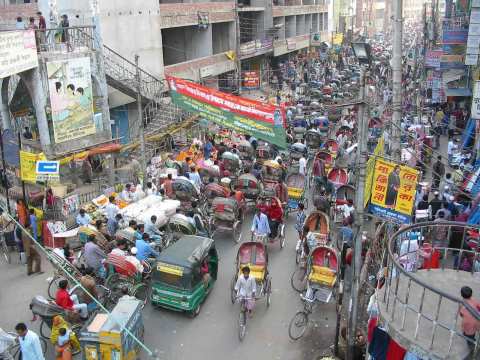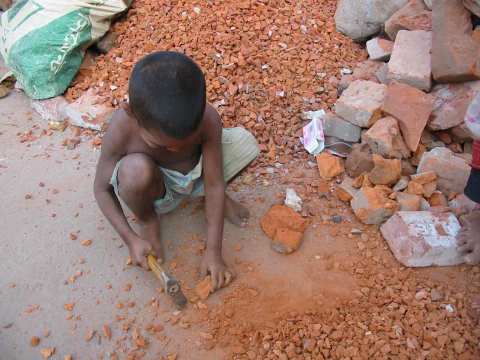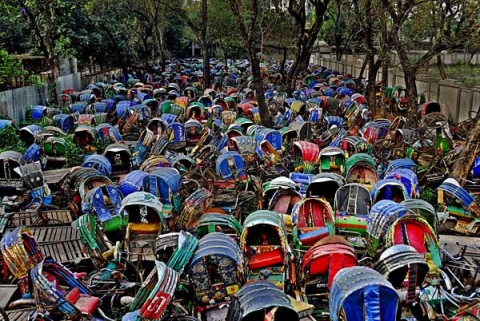Emotions of a rickshaw ride
Posted on: May 2, 2009
- In: Rickshaw | Rickshaws
- Leave a Comment

Photo Credit: Google
Even though many would not agree with me, I belive one of the most uniquely relaxing experiences that Dhaka city has to offer is a rickshaw ride through the twists & turns of its innumerable lanes & bylanes. The overall feeling is sort of difficult to explain, simply put – its is just a surge of serveal overwhelming sensations that all come at the same time. Maybe it is the light wind in my hair as the rickshaw wheezes by, or maybe its is the smooth changing scenery – it can even the funny “kring kring” noise of its horn that is so much more forgiving to the ears than those blaring car horns. On a recent ride in a rickshaw I noticed something obvious but rather interesting. In a car it is almost impossible to properly notice your surroundings since most of the time it is going to fast. However, in a rickshaw the speed is just right – to notice the smaller details. It is in a rickshaw that you can notice the name of the small grocery shop, or eavsdrop a bit of the vegetable sellers conversation. It may not seem much – but for me its the small details that make all the differece. To sum it up a a rickshaw ride is not just a meaningless transit – it is a story on three wheels!
A glimpse into their lifestyle
Posted on: May 2, 2009

Photo Credit: Google
It is apparent that every rickshaw puller in Dhaka city has a living standard that can hardly be called adequate. However, in this post I would prefer concentrating on its maritial aspect. Much like all low income earners in our city – many rickshaw pullers choose to have a large family with many children. This is a strict traditional approach, since in earlier times the life expectancy of newborns were much less & many would die within a year of birth – therefore people would like to have many kids so at least some of them get to survive. Even though such mentality seems harsh in our modern times, but sadly – it is still a priority many rickshawpullers follow even today. The other reason to have a large family of course – is so that the children can help support the family financially as soon as they are able to. Hence, if one would care to find out – many of the child workers all over the city are sons & daughters of rickshawpullers. The rickshawpullers also have a higher rate of divorce & many cases of women abuse occour due to them.
Cancer among Rickshaw-pullers
Posted on: May 2, 2009
Photo Credit: Google
Smoking is quite a common habit amongst most of the working classes of people, especially the labors and the rickshaw/van pullers. Being the lower class of the society they smoke inferior quality cigarettes, most of the time biri and consume other forms of tobacco like gul, white smoking leafs, zarda etc. due to frequent tobacco consumption a huge number of these people suffers from the fatal disease cancer. Currently there were numerous researches with the health of rickshaw pullers of Bangladesh some of which are still going on. Recent researches show that nearly 75% of the total rickshaw pullers are chain smokers and consumes other tobacco forms. Amongst them many suffers from lungs cancer due to tobacco usage and severe air pollution of the cities.
Rickshaw Mechanic
Posted on: April 28, 2009

Photo By Monica Chowdhury
As seen in the picture here a rickshaw mechanic is fixing a tire leak. These street mechanics are found at pavements and roadsides across the cities. They provide services for instant minor repairing of the rickshaws. Sometimes rickshaw pullers use the tools of these mechanics on their own e.g. inflating their rickshaw tires by the air pumper, and pay for the lending service. They sit over the pavements with their tools and other equipments and provide services to the rickshaws for late night. Few also work during night especially at places where rickshaw stands are alive throughout the night. They earn a little amount compared to the expenses to run their family, but even then they had to sit in the road for a long fixed time expecting next clients to come.

Photo By Monica Chowdhury
A Rickshaw-puller starts pulling his Rickshaw early in the morning and he keeps on pulling throughout the day to earn his living but still, what he earns is not enough to satisfy the daily needs of his entire family. Therefore the rest of his families often have to work to support him to bear the expenses of the family.
These women are sitting by the side of the street near High-court and making different kind of jewelries like- ear rings, necklaces, bangles and many more things with plastic beads and selling them to people walking by the street, and this is how they earn their living.
Lunch In Footpath!!!
Posted on: April 24, 2009
- In: Lunch time
- 2 Comments

Photo By Salman Sayeed
The Rickshaw-puller parked his Rickshaw and sat for his lunch in the footpath where this lady was sitting with the food! I thought why is he here, doesn’t he have a house and family of his own where he can have his meal, and many questions were raised in my mind. Then instead of thinking any further I went forward and asked him. He said he lives out of the city and early morning starts from home for his work, therefore it is not possible for him to go back to his place for lunch. I asked that why doesn’t he live in the city or why not maintain his profession where he lives, then he said that he works for 10 hours and the amount that he earns a day is not enough to maintain the expenses here in the city and as everything is expensive, which is unaffordable for him as he has a big family with six children. He also claimed that not much people use Rickshaw as a transport where he lives, so he doesn’t get the opportunity to earn enough money there like the city.
I was also eager to know about the lady who was serving the food. She mentioned that this is how she earns her living by cooking all day and serving food to these people.
An Untold Story
Posted on: April 21, 2009

Photo by Monica Chowdury
I was walking by the street of Dhaka University to take some pictures for my photography course, when my eyes moved at the corner of the street where these little boys were playing with some empty bottles and some colorful straws. I don’t know why but I became curious to know about them! Somehow these little children really touched my heart. Some of them mentioned that their fathers are Rickshaw-pullers. So I inquired about their life style. Some of them said they read in schools but most of them just play around and do nothing. At that point I realized that they have no idea about the importance of education and neither does their parents. Therefore I told them that they should all go to schools and gain knowledge so that they can earn a lot of respect and money in the society and lead a very good and healthy life in the future.
After a while I took out my camera to take their pictures, and I cannot express in words how happy they were. Before I could ask them to stand in a line, they started giving different poses. Then I told them that I will take their pictures only if they promise me that they will convince their parents to admit them to school. Without even uttering any other word they all at once smiled and screamed saying the word “PROMISE’’.

Photo Credit:Wikipedia
Rickshaws also have to be registered by the code of Dhaka City Corporation and put a number plate in it as a mark of their identification. Though compulsory many rickshaw owners do not abide by the rules for saving a little money but on the other hand suffers from a whole loss of the vehicle itself at times. City Corporation at intervals releases mobile teams which checks the registrations of each rickshaw available at any given area. If any rickshaw doesn’t possess proper registration it is instantly confiscated and taken away to DCC vehicle dumping zones for termination. After such confiscations recently the owners are nowadays have become careful about the legal bindings of their vehicles and most of the rickshaws are registered.
- In: passengers | Rickshaw-puller | Rickshaws | Umbrella
- 4 Comments

During rainy days, when most of the places and streets of the cities are water logged, Rickshaws are the one and only way of transport by which people travel in calamities. During rainy season, due to poor drainage system the roads are flooded and causes mechanical problems to the fuel run vehicles, which most of the times ceases being effected by water. Thus Rickshaw remains the only hope for people to move to their destination during most of the natural calamities .During these sort of natural calamities the Rickshaw-pullers charges more than the regular rate.
Rickshaw Art
Posted on: March 24, 2009

Photo credit:google
Rickshaw art is a very old and common thing in Bangladesh. We can see many types of designs drawn at the back of Rickshaws in the road. After the liberation war many rickshaws used to have paintings related to the war, there used to be paintings of freedom fighters, Pakistani Army and many more things involved in the war. Nowadays we can see pictures of actor n actresses of Bengali cinema, pictures of different flowers, birds and religious words on Rickshaws.
The rickshaw painters who does all the paintings on Rickshaws lead their life hand to mouth. They work in the stores where they gets the opportunity to do all these paintings and this is their only earning source by which they earn their family.

